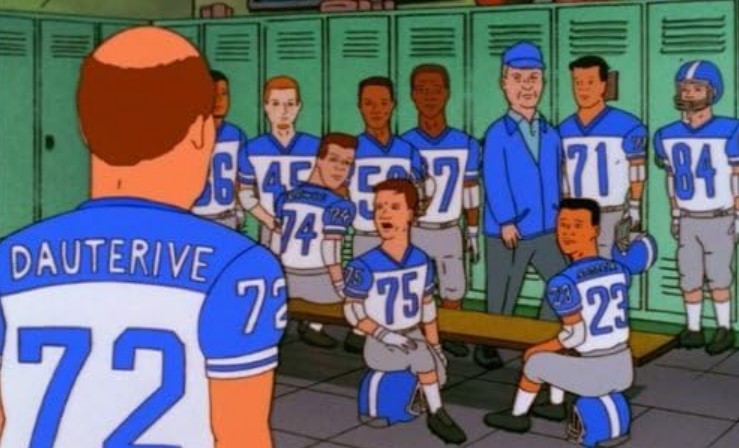With King of the Hill’s revival now in full swing, there’s one character new fans might disregard: Bill Dauterive. The perpetually unlucky, chronically lonely neighbor of Hank Hill has been a constant source of both heartache and hilarity across the series’ original 13-season run. While Dale and Boomhauer might get the easy laughs, Bill’s storylines are often a mix comedy with a surprising emotional depth. They often provide us with the emotional range King of the Hill has.
Videos by ComicBook.com
But before you jump back into Arlen, Texas, it’s a good idea to get to know the characters as they once were. This time, it’s Bill’s turn. And these are the 10 episodes we think best introduce you to Bill. Each of these highlights a different side of Mr. Dauterive — from his lowest moments to his rare victories.
10) “Maid in Arlen“ (Season 7, Episode 22)

This episode gives Bill one of the rare moments where he finds genuine romance.
Bill’s relationship with Laoma starts in a sweet, almost accidental way — two lonely, overlooked people finding companionship where neither expected it. His openness to Laoma’s attention feels authentically “Bill”; born out of deep need for connection and willingness to embrace anyone who treats him with kindness.
When Laoma’s son, Kahn, sabotages the relationship, Bill’s heartbreak hits hard precisely because he’s been so open and trusting. His eventual decision to chase Laoma down after talking with Hank becomes a small but meaningful triumph, showing that he’s capable of fighting for something he values.
9) “Be True to Your Fool“ (Season 7, Episode 19)

“Be True to Your Fool” captures the complicated, often frustrating, but ultimately moving nature of Bill’s friendship with Hank. At first, Bill is at his most maddening. He’s careless, lonely, and inadvertently spreading lice to all his friends in a misguided attempt to impress a woman. The fallout isolates him from the group, and for a while it feels like another story where Bill sabotages himself and gets left behind.
But in a flashback to Bill’s youth, we learn that Bill once protected a drunk Hank in a dangerous situation, and Hank decided to get Bill’s name tattooed on his head as a sign of his gratitude. Hank’s tattoo is a sign that beneath all of Bill’s present-day blunders is a long history of being there for his friends in ways they don’t always acknowledge.
8) “Bill, Bulk and the Body Buddies“ (Season 11, Episode 11)

For a brief, shining moment Bill transforms from sad-sack to fitness fanatic. After getting roped into bodybuilding with a couple of ultra-intense workout partners, in “Bill, Bulk and the Body Buddies”, Bill’s physical transformation shocks the neighborhood, and feeds his ego just enough to cause trouble.
This episode lets Bill break out of his usual rut and experience a different side of life. His newfound confidence is both ridiculous and endearing, and it gives us one of the rare instances where Bill gets to feel good about himself… at least until it all inevitably falls apart. When he bulks up, Bill adopts the swagger of someone who’s been training for years, but also becomes the town bully. His inevitable crash back to reality is what makes King of the Hill so loved. It’s funny, painful, and a sharp nod to the reality behind the surface aesthetics.
7) “’Twas the Nut Before Christmas” (Season 5, Episode 8)

Bill’s decision to turn his front yard into a Christmas village starts as a genuinely sweet act of community spirit, and something that gives him joy. It even makes Hank cautiously optimistic given Bill’s history of holiday depression. But as the decorations linger far beyond the season, the story shifts into a bittersweet exploration of Bill’s inability to let go of fleeting happiness.
When local slacker, Wally, enters the picture, the episode becomes an even sharper character study. Bill’s eagerness to believe the best in this manipulative drifter is a reflection of his deep hunger for connection, even if it means ignoring obvious red flags.
That blind trust leads to his own humiliation and loss, but it also underscores why Bill is so endearing — he would rather risk being hurt than close himself off. By the end, Bill convinces Wally to join the Army instead of facing jail time. By doing this we see that his compassion will always come first.
6) “Blood and Sauce“ (Season 11, Episode 3)

This episode revolves around Bill’s Louisiana roots and a cherished family barbecue sauce recipe, which becomes a symbol of heritage, pride, and love passed down through generations. What makes this episode such a key example of Bill is how much he values family traditions but can see family extends beyond bloodlines. When Bobby is roped into helping Bill prepare for the Dauterive family reunion, Bill doesn’t just see him as an extra pair of hands, but as someone he can include in something meaningful. Even when Bobby struggles with the hard work, Bill patiently covers for him and encourages him to stick with it, embodying the kind of quiet support that defines his character.
The blend of food, family, and heartfelt moments creates a rich and tender backdrop that makes “Blood and Sauce” one of the most touching stories centered on Bill. It’s a rare glimpse of his strength and kindness, making the episode a celebration of family, tradition, and the gentle resilience that defines Bill Dauterive.
5) “Tankin’ It to the Streets“ (Season 6, Episode 14)

“Tankin’ it to the Streets” stands out as a great Bill story because it perfectly captures the mixture of tragedy, confusion, and unexpected heroism that define Bill’s character. The revelation that Bill was unknowingly subjected to a secret government experiment that physically changed him and derailed his life, adds a heartbreaking layer to his usual lovable — but hapless — persona. His drunken rampage that leads to him stealing a tank is both absurd and deeply tragic, showing how Bill’s pain and frustration can erupt into chaos when he feels powerless. Yet through it all, Bill’s core goodness shines despite everything. Through his pain he still manages to protect his friends and even charm a police officer, reminding viewers of his enduring spirit.
The episode also poignantly explores the themes of betrayal and identity, as Bill struggles with the idea that his problems might not be his fault but also might not be fixable. His friends’ loyalty and desperation to save him highlight the strong bonds Bill has to those closest to him, even as he grapples with feelings of shame and loss. The mix of absurd comedy with real emotional stakes makes this episode a standout exploration of Bill’s complexity and resilience.
4) “Bills Are Made to Be Broken“ (Season 4, Episode 3)

This episode truly shines as a heartfelt and memorable exploration of Bill’s character, highlighting his past glory and deep desire for respect and recognition. Bill’s long-held football record serves as a symbol of his pride and identity which is something that defines him beyond his usual meek and awkward persona. As Ricky Suggs threatens to break Bill’s career touchdown record, we see Bill in a rare spotlight, where his achievements are finally acknowledged by the whole town. The episode shows Bill’s genuine sportsmanship and the internal conflict he faces as his record is challenged.
The episode also captures the bittersweet nature of aging and lost glory, as Bill pushes himself to reclaim a piece of his youth while confronting the physical limits that come with it. The closing scene, with Bill working out and being praised on the radio, beautifully wraps up his journey with a sense of hope and renewed confidence.
3) “Après Hank, le Deluge“ (Season 8, Episode 15)

Bill’s caring side takes the spotlight again in this episode, but this time, it’s played out through helping the townspeople survive. When Arlen floods, Bill is put in charge of the local emergency shelter. At first, he is well beloved by the town, and rises to the challenge. But it’s not long until the power starts to go to his head.
It’s a classic example of Bill’s inability to control his need for attention. He starts with good intentions, enjoys a brief moment of competence and control, then lets pride and insecurity drag him down. Bill shifts from caretaker to petty tyrant fast, but the sad part is that it all comes from him actually want to help people and be appreciated. This episode also serves as a reminder of how often Bill’s desire to be respected is at odds with his ability to handle responsibility.
2) “Dia-Bill-ic Shock“ (Season 13, Episode 1)

This episode is a deeply moving exploration of Bill’s vulnerability when his health takes a serious turn and he’s diagnosed with diabetes. For a character whose humor often comes from physical misfortune, the episode treats the diagnosis with a surprising amount of weight, while still finding space for comedic beats. The way Bill processes this news by alternating between denial, overreaction, and brief moments of genuine concern feels painfully real. His struggle with the wheelchair is especially heartbreaking, though it offers a new path to confidence and strength through wheelchair rugby. His confidence is bolstered, only for him to unexpectedly recover and get rejected by those around him.
This episode stands out because it goes beyond the usual humor to reveal Bill’s true self. His pain, his hopes, and his fierce desire to be seen and valued. It’s a tragic, yet ultimately uplifting portrait of a character who often fades into the background.
1) “Pretty, Pretty Dresses“ (Season 3, Episode 9)

“Pretty, Pretty Dresses” is such a powerful Bill story because it dives deep into the tragic loneliness and heartache that define much of Bill’s character. His intense fixation on his ex-wife Lenore, including saving gifts for her return years after their breakup, shows how painfully stuck he is in the past. Unable to move on or find closure, especially on the anniversary of her leaving him Bill’s depression infiltrates the Hill family’s holiday celebrations, and Bill’s dress sense.
Turning joyful moments into reminders of loss, highlights his isolation and the strain his pain puts on friendships. Hank’s willingness to care for Bill, even when pushed to his limits, underscores the bittersweet nature of their friendship through their loyalty that’s intertwined with sorrow. Ultimately, the episode portrays Bill’s struggle with compassion and nuance, capturing his vulnerability and the quiet tragedy of a man desperately searching for love and acceptance in a world that too often rejects him.
Stephen Root’s performance is perfect, capturing both the humor and the quiet tragedy of the character. This episode serves as both one of Bill’s best, but also one of the best explorations of loneliness ever done in an animated sitcom.








